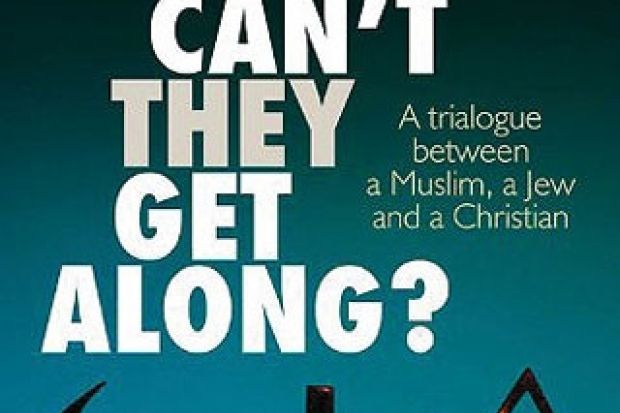From the title of this book, I was braced for a self-congratulatory, ecumenical declaration that we are one species, that our three religions all go back to Abraham, that we worship the same God, that the similarities among our religions outweigh the differences, and that for the differences we should demonstrate “mutual respect” – a phrase that makes me, as Hermann Göring is reputed to have said on hearing the word “culture”, want to reach for my gun. I expected to read that we should all join hands and sing We Shall Overcome.
Happily, this debate among three well-known UK-based academics is almost the opposite. While the exchanges are polite, they are tough and unbending. Despite their litany that “All of us believe in the same God, although we may worship Him in different ways”, all three stress the uniqueness of their own religion. Dan Cohn-Sherbok emphasises the changes that Judaism has undergone since the Enlightenment and objects to the view that Judaism means ancient Israel. By contrast, Dawoud El-Alami notes that Islam, unlike Christianity as well as Judaism, did not partake of the Enlightenment and so cannot be expected to conform to its ethos, which is that of modernity.
The authors cover teachings, practices, “ethics and lifestyle” and “societal issues”, and each topic is divided into four subtopics. On the subtopic of God, the trio debate the following preliminary statement: “Christians hold that God sent His son – the Messiah – to save the world, which he accomplished by his saving death on the cross. Such a claim is unacceptable to Jews and Muslims. Jews do not accept his messianic status, and the Koran states that Allah never had a son.” The three authors elaborate on these differences but do not deny them.
On the subtopic of Jesus, George Chryssides states that “there can be little doubt that Jesus was crucified”. He therefore has “problems with the Muslim view that Jesus was not crucified”. He then asks, “Why is it that Jews have confidently taught that the Messiah will come, but yet are reluctant to acknowledge that this may have happened?”
The answer is that Jews believe that the Messiah will be human rather than divine, will be a military leader and will be descended from David, will lead Jews to a permanent victory over all their enemies, and will establish an eternal kingdom on earth. Rather than rejecting Jewish law, the Messiah will enforce existing law scrupulously. For Jews, Jesus is thus the least likely candidate for messiahship. And modern Jews, called “Liberal” or “Reform”, do not even believe in a Messiah but in a messianic age.
On issue after issue, the discussants stand their ground. On the final issue, the Middle East, they are at their testiest. Cohn-Sherbok blames Christianity for anti-Semitism and even for the sentiments behind the Holocaust. He defends the right of Israel to exist. El-Alami challenges that right and cites the “terrorism” of the Irgun movement and the Deir Yassin “massacre” of April 1948. Chryssides rejects the Jewish biblical claim to a homeland.
The stands that the trio make on all issues except that of social justice are not merely distinct but incompatible. They cancel one another out and may all be wrong. And certainly the grounds for the beliefs are internal rather than objective. The differences, commendably never denied, confirm the line that where there is only one science, there are thousands of religions.
Why Can’t They Get Along? A Conversation between a Muslim, a Jew and a Christian
By Dawoud El-Alami, Dan Cohn-Sherbok and George D. Chryssides
Lion Books, 240pp, £9.99
ISBN 9780745956053
Published 18 April 2014
Register to continue
Why register?
- Registration is free and only takes a moment
- Once registered, you can read 3 articles a month
- Sign up for our newsletter
Subscribe
Or subscribe for unlimited access to:
- Unlimited access to news, views, insights & reviews
- Digital editions
- Digital access to THE’s university and college rankings analysis
Already registered or a current subscriber? Login





